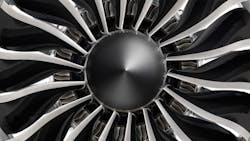Alcoa Expanding Aerospace Investment Casting in Virginia
Alcoa Howmet launched a $25-million expansion of its Hampton, VA, investment casting foundry to produce a new range of aerospace parts, adding another manufacturing line and modifying some current equipment to cast airfoil blades for jet engines. The project also signifies a product line expansion of sorts: presently, the Hampton foundry produces airfoils for industrial gas turbines and large structural castings, in nickel and titanium alloys.
In addition to new and modified production equipment, Alcoa noted the expansion would include robotics and digital X-ray capability for enhanced product inspection.
The Virginia project also may be seen as a complement to the $100-million expansion announced in May for the investment-casting foundry at LaPorte, IN. There, Alcoa Howmet (the investment casting subsidiary of Alcoa Inc.) will be producing larger castings for jet engine parts other than blades, including turbine stators and vanes, and turbine cases, among others.
“We are deploying a state-of-the-art technology that will significantly improve the performance of some of the best-selling jet engines in the world,” stated Alcoa chairman and CEO Klaus Kleinfeld at the Virginia project announcement. “This technology and investment further demonstrate how Alcoa is executing on our strategy to aggressively capture demand in the fast-growing aerospace market.”
The expansion will begin this month for completion late in 2015. Alcoa said it would receive approximately $2 million in state and local incentives for the Hampton expansion, and an additional $1.3-million exemption on sales and use tax.
At least 75 new employees will be added over three years as a result of the new capacity, Alcoa indicated. Currently, the Hampton plant has 650 employees.
"Enhanced" Equiax Casting
Alcoa indicated it is installing a new “enhanced equiax casting” (EEQ) process that it has been developing for about five years. In general, the equiax process is used by investment casting foundries to manage the solidification process of metal: ceramic molds are preheated to a temperature below the alloy’s solidification point, so that when the mold is filled the solidification can be controlled to achieve a desired, uniform grain structure in the cast part. The metal’s grain structure is critical in parts like turbine blades because of the high stress and high temperature inherent to such applications.
Alcoa added that its new process would cast parts that are 20% lighter than its highest-volume jet engine blades, with significantly improved aerodynamic performance.
The new blades will be produced primarily in nickel-based superalloys. The finished parts may be retrofitted to existing aircraft engines, or supplied to some of the new jet engine programs.
As in the Indiana expansion, Alcoa identified the new, narrow- and wide-body commercial aircraft programs as targets for its new products.
Narrow-body commercial jets represent the highest volume product lines for both Airbus (e.g., A320) and Boeing (737), for which both OEMs are listing increasingly high volumes of orders and commitments, as new carriers emerge to serve rising demand in developing markets like China and India, and established airlines replace aging fleets and adopt newer designs capable of higher carrying capacity, longer range, greater fuel economy, and lower fuel emissions standards.
Alcoa said the investment is in line with its strategy of expanding its aerospace business, from which sector it reported $4 billion in 2013 revenues.
About the Author
Robert Brooks
Content Director
Robert Brooks has been a business-to-business reporter, writer, editor, and columnist for more than 20 years, specializing in the primary metal and basic manufacturing industries. His work has covered a wide range of topics, including process technology, resource development, material selection, product design, workforce development, and industrial market strategies, among others.
